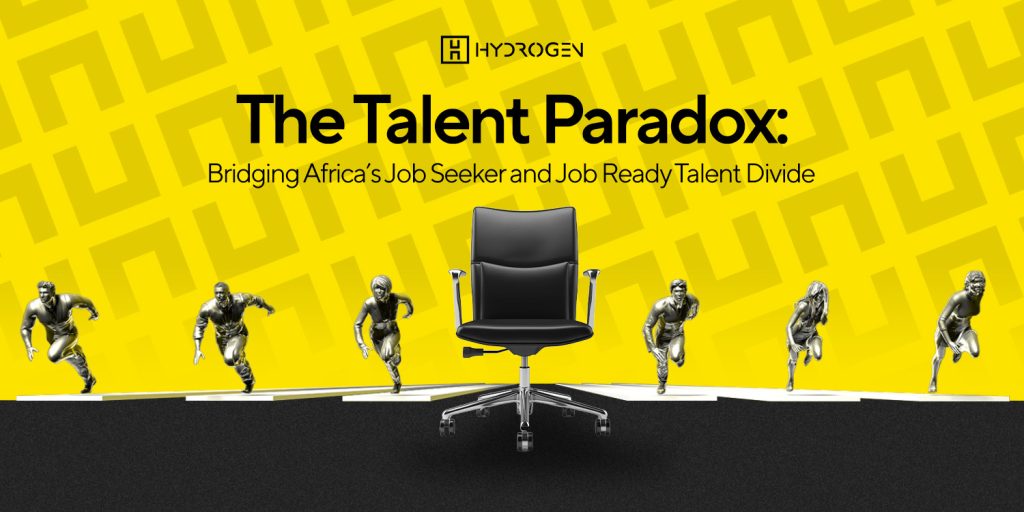The Talent Paradox: Bridging Africa’s Job Seeker and Job Ready Talent Divide

Africa’s professional landscape is full of energy: startups are emerging, fintech is expanding, and global attention is focused on our next generation of innovators. Yet, despite this momentum, hiring managers frequently express frustration over the difficulty in finding job ready talent—while graduates and young professionals struggle to find meaningful employment.
This is the paradox: we do not have a shortage of talent, but rather a shortage of accessible pathways, practical alignment, and enabling ecosystems. Below are six practical strategies that organizations and individuals can implement now to begin bridging this gap.
- Embrace the Starting Point
It is perfectly fine not to have everything figured out at the beginning of your career. Many professionals start without a clear map, and that is okay. What matters is movement, not perfection.
Imagine standing at the base of a mountain, unsure of the exact route to the top. Instead of obsessing over the summit, focus on your first few steps—update a skill, reach out to a mentor, or start a small side project.
- Celebrate small wins. Completing an online course, initiating a stretch project, or reaching out to someone in your field are important milestones.
- Keep moving. Progress compounds, and with each small step, confidence and clarity grow.
- Cultivate Integrated Learning Ecosystems
Talent does not thrive in isolation. Education, mentorship, hands-on experience, and support must all work together to create meaningful development.
Think of an ecosystem: a tree needs more than just water—it also requires sunlight, nutrients, and the right environment to grow. Your career growth is no different.
- Create mentorship circles: Encourage structured group sessions where peers and professionals share advice, challenges, and experiences.
- Engage in real-world projects: Collaborate with startups, NGOs, or innovation labs to solve real problems and gain practical insight.
- Foster collaboration between academia and industry: Institutions and companies should work together to align training with market needs.
When learning is connected to context, it becomes more relevant and more sustainable.
- Redefine Career Growth as a Lattice
The traditional idea of a career ladder is too narrow. Growth does not always mean moving up—it often means moving across, diagonally, or even backward for a better forward leap.
Picture a web of opportunities, where every direction can lead to progress.
- Enable lateral rotations: Let employees explore different departments to build broader perspectives.
- Support skill-stacking: Combine different skill sets—such as design and product management—to create more versatile professionals.
- Offer short-term assignments and secondments: Let professionals experience different roles and sectors to diversify their expertise.
This approach results in resilient, well-rounded individuals who are ready for leadership in a rapidly changing world.
- Empower Proactive Innovation
Innovation should not be the job of a few—it should be embedded into the culture. Professionals at all levels must feel free to experiment, suggest improvements, and lead change from where they are.
Visualize a workplace where ideas are shared freely, tested openly, and refined collaboratively.
- Dedicate time for innovation: Allocate hours specifically for brainstorming or prototyping.
- Encourage show-and-tell sessions: Let teams share new ideas or mini-projects during regular meetings.
- Celebrate the process, not just the outcome: Recognize efforts and lessons from experiments, even those that did not succeed.
When innovation is accessible, people feel a stronger sense of ownership and contribution.
- Shift from Job Seekers to Job Builders
A builder’s mindset transforms how we approach work. Instead of focusing on tasks alone, professionals should see each role as an opportunity to create, improve, and lead.
Imagine every job as a platform to solve problems—not just complete checklists.
- Enable intrapreneurship: Offer team members the space and autonomy to launch small internal projects that address real needs.
- Define problems, not just roles: Let employees propose solutions to organizational challenges.
- Establish fast feedback cycles: Allow teams to test, iterate, and adapt ideas based on feedback.
This mindset helps professionals build purpose into their daily work—and helps organizations uncover talent from within.
- Foster Continuous Relevance
In today’s fast-moving world, skills become outdated quickly. Relevance is no longer a fixed trait—it is something that must be practiced and refreshed continuously.
Think of learning as a muscle: if you do not use it, it weakens. But if you train it regularly, it keeps you agile and resilient.
- Offer flexible learning budgets: Provide support for courses, certifications, or access to digital libraries.
- Encourage peer-to-peer learning: Create opportunities for team members to share insights and skills they are developing.
- Stay plugged into industry communities: Promote participation in forums, events, and workshops that keep professionals connected to new developments.
Relevance today means adaptability. Those who stay curious and proactive are the ones who thrive.

Moving Forward: Your Next Step
Africa’s talent paradox is not an unsolvable problem—it is a call to action. It is a chance to build better systems, rethink how we develop people, and unlock a future powered by shared innovation.
Whether you are a job seeker trying to find your way or a business leader looking to grow your team, these strategies are a starting point. Choose one and begin. Real transformation does not require massive change all at once—it begins with one intentional step.
So, what is the first step you will take this week? Share it in the comments or discuss it with your team. Africa’s future will not be built by job seekers alone—it will be built by builders, learners, and doers who choose to show up, every single day.
Let us build it together.
 Transacting at the speed of light
Transacting at the speed of light 